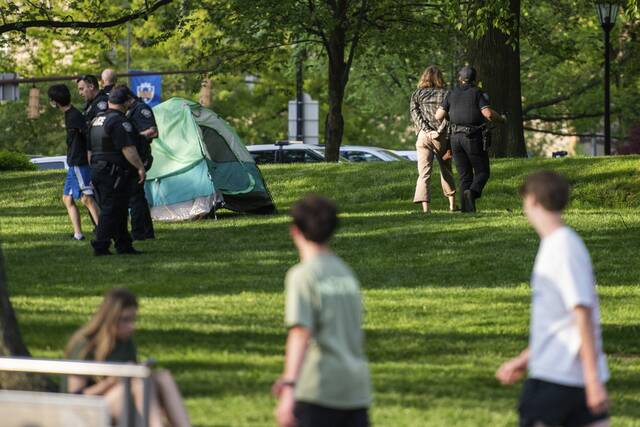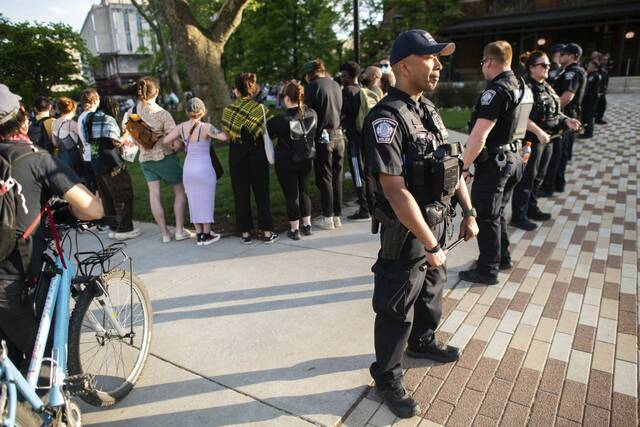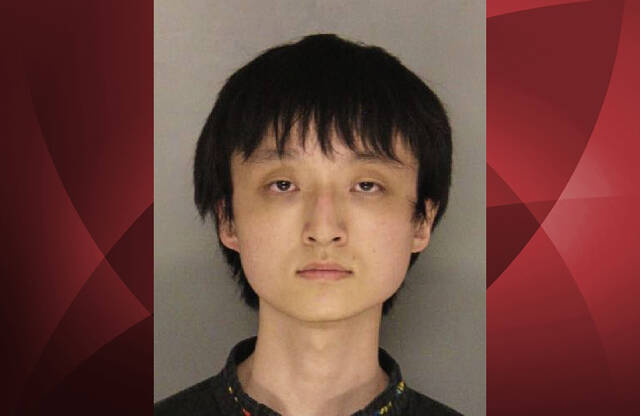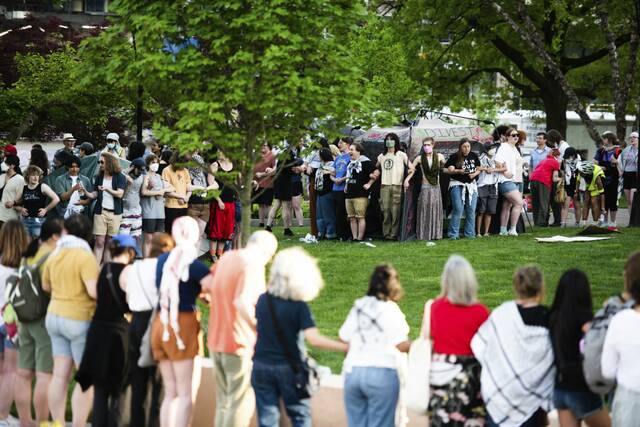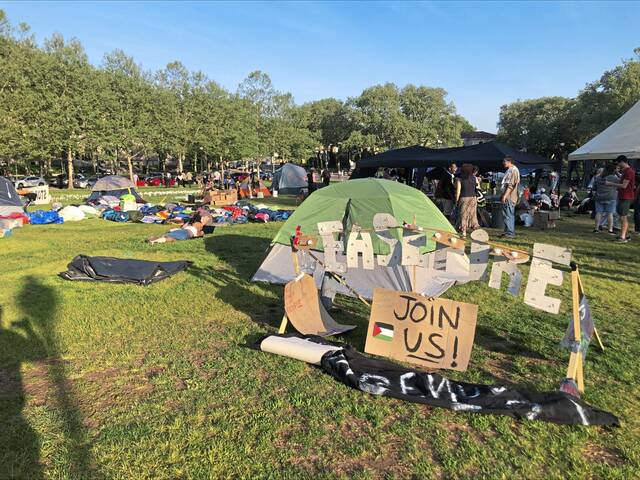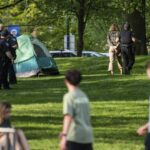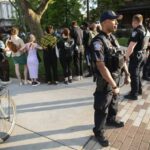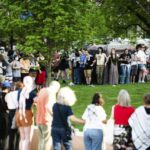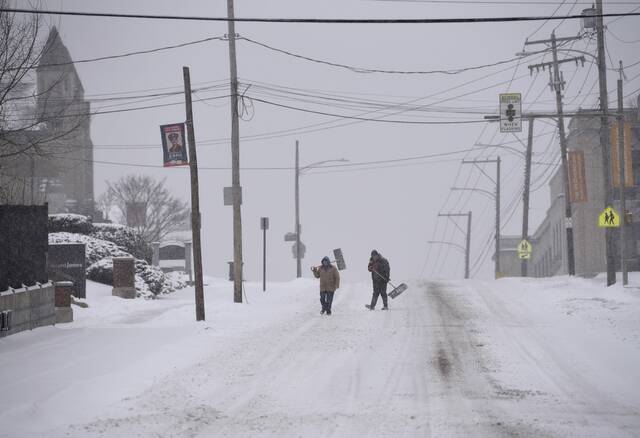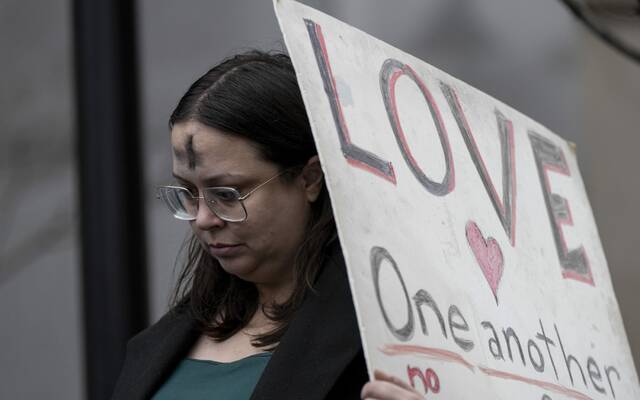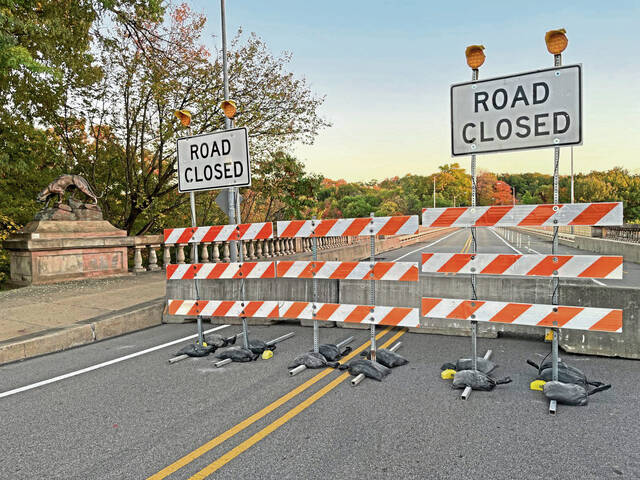About 100 pro-Palestinian protesters remained at Schenley Plaza Monday evening, a decline compared to the encampment over the weekend.
Multiple students at the site Monday declined to speak with TribLive, citing coverage of arrests made the night before when University of Pittsburgh police arrested two people, including a student, on trespassing charges as officials worked to clear pro-Palestinian protesters who had moved from City of Pittsburgh property onto school grounds.
Jared Stonesifer, a Pitt spokesman, confirmed the arrests but said Monday that he did not have any additional information.
Using court records, TribLive identified one of the people arrested as a Chester County man, Haiwei Hu.
Hu, 20, of Easttown Township, was arraigned at 12:45 a.m. Monday on a misdemeanor trespassing charge and released on a non-monetary bond.
Court paperwork does not indicate if Hu was taking part in the pro-Palestine protest, which began last Tuesday and has drawn hundreds of demonstrators and a small number of tents.
Hu did not respond to an email Monday morning seeking comment.
An individual with the same name as Hu was identified in an online Pitt database as a trainee in the director’s office at the University Center for International Studies in Wesley W. Posvar Hall.
That individual was a Frederick Honors College student who had been studying computer science, according to the database.
No information was available about the second person arrested.
Class of 2024 balloons can be seen hanging from the tents at the pro-Palestine encampment in Pittsburgh. Many participants are Pitt students, and some are now graduates.
Roughly 16 tents are still set up — and some are being taken down @TribLIVE pic.twitter.com/jeCPuJHgLN
— Megan Swift (@mgswift7) April 29, 2024
Pitt police had two interactions with Hu on Sunday. They first stopped him at 6:36 p.m. for trespassing on university property. Hu was near the Cathedral of Learning, in the 4400 block of Bigelow Boulevard, a criminal complaint said. Police said they told Hu to stay away from Pitt property.
But at 11:06 p.m., Hu returned to the William Pitt Union driveway, still holding his trespassing citation from the previous arrest in his hand, the complaint said.
Pitt police handcuffed Hu and took him to the Allegheny County Jail, the complaint said.
Hu’s attorney was not listed in court records.
The confrontation with Hu came after six days of relative calm between pro-Palestinian protesters and police. On Sunday, the crowd swelled to about 200 demonstrators. Police said protesters moved from Schenley Plaza on city property to the lawn outside the student union despite an informal agreement not to occupy university property.
The protesters remained on Schenley Plaza on Monday.
Tents are still set up here in Schenley Plaza in Pittsburgh as part of the pro-Palestine encampment that’s been going on for almost a week now.
Some are packing up their stuff, however. Organizers said they’re still deciding whether they will stay or leave @TribLIVE pic.twitter.com/tsQktgYpoC
— Megan Swift (@mgswift7) April 29, 2024
Emily Bourne, a city police spokeswoman, said police officers are monitoring the situation and have increased patrols.
A permit is not needed for protests on the plaza lawn, said Maria Montaño, a spokeswoman for Mayor Ed Gainey.
City police have not arrested or cited anyone in connection with the demonstration, Bourne said.
The weeklong protest was organized by a group of students under the name “Pitt Divest from Apartheid.”
The group issued a statement Monday with 12 demands for the University of Pittsburgh, including that it urge Allegheny County authorities drop charges against those arrested.
Elyanna Sharbaji, vice president of Students for Justice in Palestine and president of Students Organize for Syria at Pitt, came over to the William Pitt Union lawn after her graduation.
Sharbaji, 25, who studied psychology and political science at Pitt, helped organize the encampment.
The activity in Oakland was reflected at campuses across the country with demands that universities cut financial ties to Israel because of the Israel-Hamas war.
The extent of Pitt’s investments in Israeli military and defense companies is unclear. Protest organizers have said they have been told by the university that the information is confidential.
Sharbaji on Monday explained that the protesters had initially rallied around the Cathedral of Learning on Sunday before stopping at union lawn on their pre-planned rally and march.
Though she couldn’t attend the whole event, Sharbaji said she came over to union lawn to join the human chain that was forming around a smaller encampment.
People brought tents to set up on the lawn at the union, she said, because the protesters wanted to make sure Pitt administration was hearing their demands once again.
“It was really beautiful to see all these students and community members and faculty and staff there just to protect the students who are at the encampment,” Sharbaji said.
Human chains were formed around the tents. A larger chain formed a perimeter around the lawn area, according to Sharbaji.
Protesters stayed at the union lawn until around midnight or 1 a.m. Monday, Sharbaji said.
“(The) human chain was protecting these students even though they were at risk of getting arrested as well,” she said. “But, they still chose to stay.”
Three tents were left at the union lawn overnight, and when protesters returned in the morning, they had been taken down, Sharbaji said. No one stayed in these tents overnight, she said.
Some members of the original encampment attended one person’s arraignment Monday morning, she said.
“We wanted to make sure that we were there for these students to support them,” Sharbaji said.
The protesters originally intended to stay on campus for the encampment when it began last week, according to Sharbaji, but they were asked to leave and told protests are limited to a few hours on campus.
“We had no intention of moving (to Schenley Plaza),” she said. “We moved here with permission of the mayor that we were not going to get arrested.”
Cameryn Gray, 20, a rising senior majoring in history and politics and philosophy, was a part of the human chain on Sunday night.
“It’s really amazing to see that we protect each other,” Gray said. “All of those people were there because they did not trust the police, because they did not believe that anyone else would keep us safe — and they were there to keep their own community safe, which I think is really, really awesome.”


